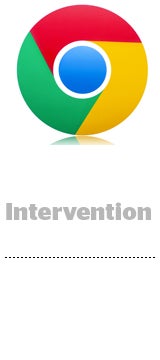
Google has said it will release a default setting to block advertisements that violate its heavy ad intervention policy by the end of August. Sources tell AdExchanger those new policies coincide with the release of Chrome 85, which is scheduled for Tuesday.
Google declined to confirm exactly when the ad intervention changes will go live, but stated they would be deployed in late August 2020 in a May blog post. A Google developer confirmed the timeline on a Chromium message board.
By Chrome’s standards, “heavy ads” consume more than 4MBs of network data or 60 seconds of total CPU.
While just 0.3% of ads exceed these thresholds, they account for 27% of overall network data consumed by ads, as well as 28% of total ad CPU usage. Google cites ads that mine cryptocurrency or host mini-games as examples of data-hungry ads.
For ad tech companies that have already cut down on network and CPU use in their ad units to improve the user experience, the impact of Chrome’s changes will be limited, said Jeremy Arditi, chief commercial officer at Teads.
“Low file sizes and minimal CPU usage are things we’ve been considering for years,” he said, “so we’re aligned with the motivation.”
But But companies that rely on long-form videos and rich media ad units may be impacted, as well companies serving or hosting ads that are overstuffed with tags. Unprepared companies risk wasting their clients’ budgets on blocked ad units.
Also, publishers that rely on long-form videos and rich media ad units will also feel the consequences.
After Google announced the changes in May, a BuzzFeed developer posted on a Chromium message board that heavy ad interventions posed a “massive risk in that over 50% of our video ads could be affected from serving on Chrome.”
The developer said BuzzFeed didn’t have enough bandwidth to handle the added reporting requirements around ad interventions, and reported inconsistencies in how interventions were deployed.
“This is a VERY high priority for us as we have a lot of client revenue tied to these video products,” the developer wrote.
Chrome’s heavy ad intervention policy goes into effect as browsers take more control over the online advertising ecosystem.
Chrome announced in January it would phase out third-party cookies in two years, and Apple said it would block IDFA usage without proper consent shortly after. Apple’s Safari desktop browser has blocked third-party cookies since 2017.
“Ad Manager and DV 360 folks who we speak to on a regular basis don’t seem to have a good grasp of what the Chrome engineers and product folks are doing,” Teads’ Arditi said. “It’s been a source of frustration for publishers and advertisers.”
"heavy" - Google News
August 25, 2020 at 11:05AM
https://ift.tt/3lnxjMz
Google's Heavy Ads Intervention Is Coming - AdExchanger
"heavy" - Google News
https://ift.tt/35FbxvS
https://ift.tt/3c3RoCk
heavy
Bagikan Berita Ini















0 Response to "Google's Heavy Ads Intervention Is Coming - AdExchanger"
Post a Comment